

5 Clear Ways To Begin A Debate With Examples
Starting a debate is a bit tricky . This little guide is a great way to get your speech flowing just right. We have collected five ways on how to get your script started with examples that can fit your situation. These have been provided as we believe that debates need not be so aggressive and competitive. If you need more help with phrases then have a look at our cheat sheet to give you some ideas.
Tell a personal story
People are drawn to stories and personal insight from their accumulated years of experience. Using what you know from firsthand knowledge can really help connect with your audience and have them remember you. While it is not about standing out, it is about being authentic, intimate, and importantly, genuine.
- When I was a child growing up in rural England, I came to accept how clean and unpolluted it was. It was only when I moved to the city where I enrolled in a University, little did I realise that air pollution and excessive waste was a big problem…
- I have a friend who is a single mother, super intelligent, really brave and emotionally bright. A few days before Christmas she was at the supermarket and was looking for some tinned soup when out of nowhere someone pushed her…
- When I was 10 years old I made a list. How to become a rich and famous before I was 30 years old. One that list I wrote down the following. Number one, get a job and put all of my money on the stock market, number two…
- When I was 23 years old I was in Manchester studying a degree in Economics, now this was a course of study recommended, or rather bestowed upon me, by those who had my best interests at heart. Friends and family who assured me that studying Economics would lead me onwards to a career brimming full of prosperity. By the third year of studying, I was a little bit disillusioned with the whole thing and I was very eager to try something else anything else…
- I was fortunate enough to be raised by hippies. So you could say I grew up with environmentalism in my bones…
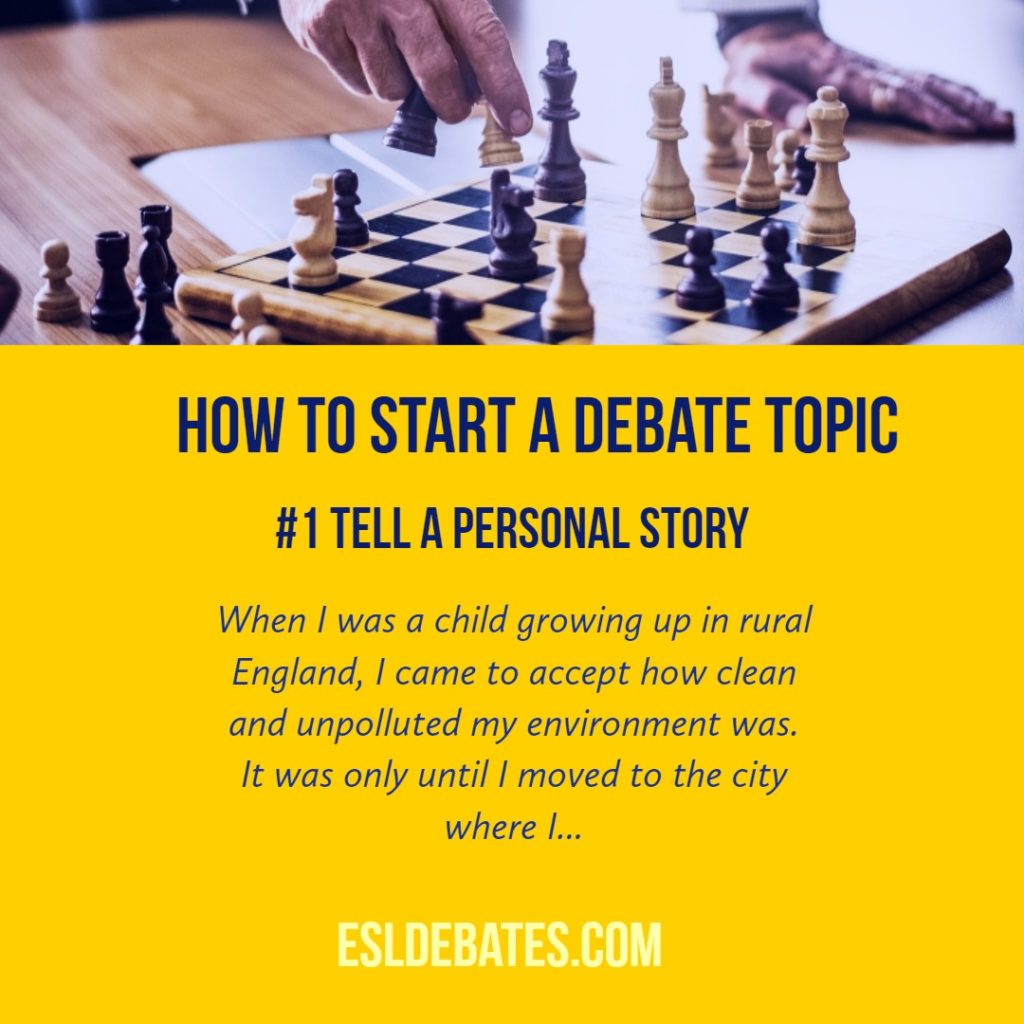
Share an amazing fact
Grabbing your audience’s attention is a great tactic too. During a debate, you can greatly improve your side’s position by giving facts, data, and statistics to bolster your points. If the facts are in your favour then you ought to argue the facts.
- The average person in the UK only has 12 weeks worth of their income saved in the bank…
- The average person spends 36% of their life asleep. For students, that’s a lot more.
- Did you know that at least 60% of girls interviewed said that they have an unhealthy relationship with their body image…
- If you had to make a guess to how people die each year as a result of legal drug use in the entire world. What would you guess? Perhaps, 10,000 a year? Well, according to a UN report, the number was over 200,000 each and every year.
- There are approximately 20 million Americans who suffer from hyperthyroidism. The drug which helps their condition, Synthroid, and so prevents them from entering a dangerous coma, was developed with the help of animal testing from dogs, mice, and rats. Without this drug, these people would live a life of uncertainty and in fear of premature death.

Use a quotation
Using the words of others can be the most succinct way to summarise a topic or idea. It also adds weight and a reputation behind your argument.
- Over the last 20 years, the number of people who are keenly changing their diet is steadily on the rise. Ellen DeGeneres notably became a vegan as she said in her own words after seeing “footage of what really goes on in the slaughterhouses and on the dairy farm”. The notion that eating meat is becoming less important…
- Parents, teachers and those in government often seek to end the public’s love affair with video games. While their fears are unfounded on fast, what is true that games can improve our mental development. Jane McGonigal, a game developer and psychologist, had this to say. “A game is an opportunity to focus our energy, with relentless optimism, at something we’re good at (or getting better at) and enjoy. In other words, gameplay is the direct emotional opposite of depression.”…
- There are many who refute the practicalities of space exploration, saying that it is not profitable and lacks the ability to fund the economy. Entrepreneurs like Elon Musk have openly agreed that “we are at the dawn of a new era in commercial space exploration”. It is becoming clearer with the passing years that commercial space exploration is financially viable.
- “The media’s the most powerful entity on earth. They have the power to make the innocent guilty and to make the guilty innocent, and that’s power. Because they control the minds of the masses”. Words uttered half a century ago by Malcolm X, while referring to a different time and context, still rings true today.
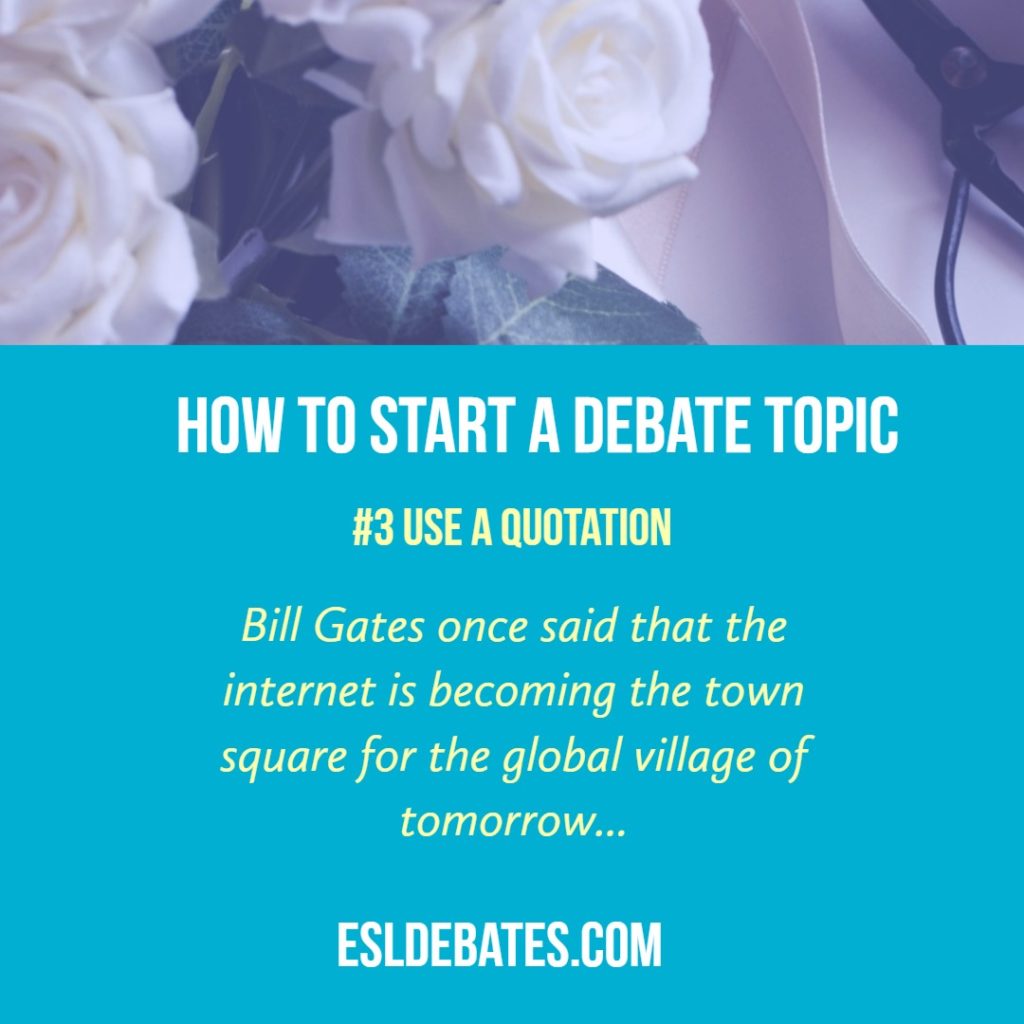
Ask a question
Starting with a question engages your audience and gets them to think in a particular frame of mind. Winning debates is sometimes down to the perspective you are able to offer your audience.
- How many of you are creative? How many of you can write a symphony? How many of you possess genius-like math abilities? AI can do all of those things and more…
- Have you ever wondered how important the ocean is in our lives? The oceans provide half the oxygen we breathe and feed more than 2 billion people each day…
- Where did you hear about Meghan Markle and Prince Harry’s marriage announcement? Was it on the radio? How about on TV? Well, if you’re under 35 the chances are that you found out on Twitter or on Facebook…

State a problem
Giving a clear idea of the
- It’s clear that our global civilisation is coming of age, we are communicating faster, doing business quicker, and learning volumes each and every day. That said, the trade in black market goods and services is not diminishing. What we choose to do with the internet can change the world.
- Technology that can be used to help people freely communicate in oppressive societies is the same technology that can be used to oppress freedom of speech. This is a problem we as a society need to resolve…

Using these five ways can really help you make a difference in your debating style and with some luck persuade your audience. let us know in the comments below how your debate went.
- how to start a debate
Read and Debate: Addressing Economic Challenges and Inflation
Navigating the ai revolution: 45 debating topics on the future of humanity in a machine-driven world, overcoming language barriers in debates: tips for expressing ideas clearly and confidently, debating the future: 145 debates critical conversations on technology, innovation, privacy, and ethical technology, 9 powerful words to help you win an argument, leave a reply.
Save my name, email, and website in this browser for the next time I comment.
- Privacy Policy
- Earnings Disclaimer
Most recent
Most popular, 30 debates on women and gender equality, 60 controversial discussion topics with teaching ideas, 56 debating topics on religion and faith, 80 debating topics on the environment.
© ESL Debates 2022 - All rights reserved.
- Interactive Presentation
How to Debate for Beginners - Nail your First Debate | 7 Steps w 10 Tips
Ellie Tran • 05 October, 2023 • 13 min read
How to debate for beginners? Arguing is a big, big topic. If you've never done one before, it can be overwhelming to think of what will happen and how you can avoid looking totally clueless in front of everyone.
There is much to learn before you can pluck up the courage to stand at the podium. But don't worry; this debate for beginners guide will give you the steps, tips and examples you need to slay your next debate. So, let's check out these lovely debate tips!
Table of Contents
- 7 Steps to Set Up a Debate for Beginners
10 Tips for New Debaters
- 6 Styles of Debates
2 Debate Examples
More tips with ahaslides.
- How to Hold a Student Debate
- Online Debate Games


Start in seconds.
Get free student debates templates. Sign up for free and take what you want from the template library!
How a Debate for Beginners Works (in 7 Steps)
Before you get into how to phrase your arguments like a pro, you'll need to know about how a beginners' debate works. Check out these 7 steps to a debate for newbies and what you'll need to do along the way, then you'll completely understand how to be a better debater!
1. The Purpose is Decided

As we can use debates in many places and situations, such as in schools, company meetings, panel discussions or political bodies, it's crucial that the primary purposes of the debate is chosen first. This can give a clear view of plan and organise the debates because there are a lot of details to work on later, all of which need to be in alignment.
So, before anything, the facilitator will answer this - what are the goals of this debate ?
For example, if you are in a student debate , the goals should be the same as your lesson, which can be to encourage students' critical thinking and public speaking skills. If it's at work, it can be to decide which of two ideas to go with.
2. The Structure is Chosen
Asking how to debate well, you need to have a structure. There are a lot of debate structure variations out there, and multiple formats within them. It's important for you to know some basic terms used in many common types of debates first before preparing for a debate...
- Topic - Every debate has a topic, which is formally called a motion or resolution . The topic can be a statement, a policy or an idea, it's up to the setting and purpose of the debate.
- Two teams - Affirmative (supporting the motion) and Negative (opposing the motion). In many cases, each team consists of three members.
- Judges or Adjudicators : The people who judge the quality of the arguments in the evidence and performance of the debaters.
- Timekeeper - The person who keeps track of time and stops the teams when time's up.
- Observers - There can be observers (an audience) in the debate, but they are not allowed to chime in.
For a beginner debate, after receiving the motion, the teams will have time to prepare. The Affirmative team starts the debate with their first speaker, followed by the first speaker from the Negative team. Then it goes to the second speaker in the Affirmative team, back to the second speaker in the Negative team, and so on.
Each speaker will talk and present their points in the set time stated in the debate rules. Bear in mind that not all debates end with team Negative ; sometimes, team Affirmative will be asked to finish.
As you're probably new to this, you can find the debate process for beginners below . It's easy to follow and can be used in lots of different types of debate.
3. The Debate Plan is Made
For the debate to run smoothly, the facilitator will have a plan that's as detailed as possible . They should let you know this plan, as it will help to visualise everything and keep you from going off track, which is super easy to do when you're taking part in a beginners' debate.
Here's a simple checklist of what a plan should contain:
- The purpose of the debate
- The structure
- How the room will be set up
- The timeline and timing for each period
- Formal debating rules and instructions for the speakers and adjudicators
- Notetaking templates for the roles
- The summary to close the debate when it ends
4. The Room is Arranged
The environment is essential for a debate as it can affect speakers' performance to some degree.
Your debate should have as professional an atmosphere as possible. There are many ways to set up a debate room, but whichever setup is chosen, it will all centre around the 'speaker area' in the middle. This is where all the debating magic will happen.
Each speaker representing the two teams will stand in the speaker area during their turn, then return to their seat when they finish.
Below is a popular layout example for a beginner debate:
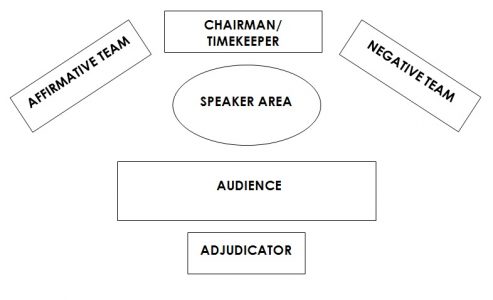
Of course, there's always the option to hold a debate online. You may struggle to feel the same atmosphere in an online beginners' debate, but there are some ways to spice it up:
- Background customisation: Each role might have a different Zoom background: the host, timekeeper, adjudicators and each team. This can help to differentiate the roles of each participant and inspire some pride in the role given.
- Timer: Timing is important in a debate, especially for newbies on their first time out. Your facilitator may decide to keep track of your pace with an on-screen timer (although in most debates, the timekeeper just signals when there is 1 minute or 30 seconds left).
- Sound effects: Remember, this is only a debate for beginners. You can expect your faciltator to lighten the atmosphere with encouraging clapping sound effects when a speaker finishes their talk.
5. The Teams are Picked
The teams will be divided into Affirmative and Negative . Usually, the teams and the speaker positions within those teams are randomised, so your facilitator may use a spinner wheel to make the process more thrilling and engaging.
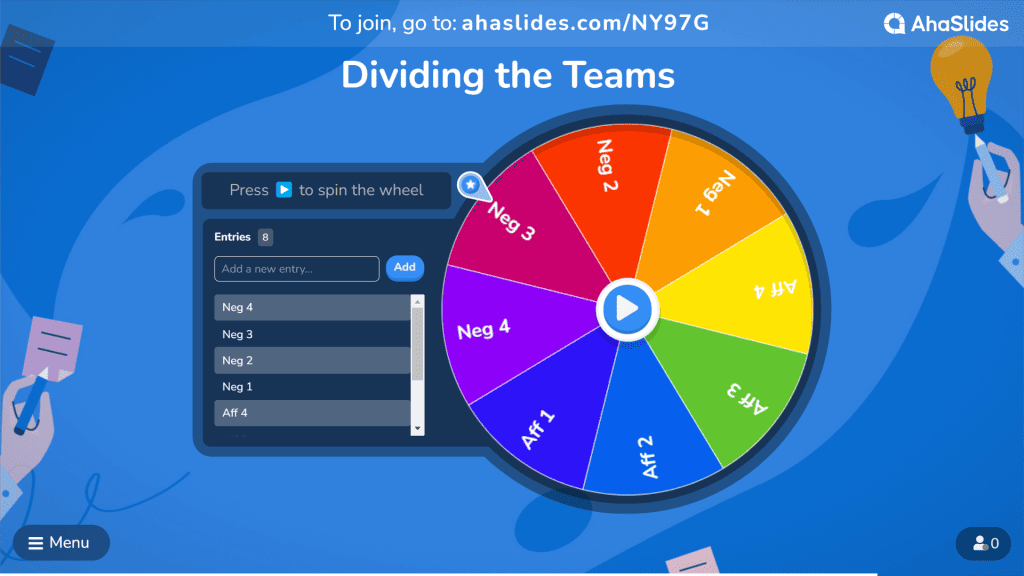
After the two teams have been chosen, the motion will be announced and you'll be given some time to prepare, ideally one hour.
In this time, the facilitator will point out lots of different resources so teams can understand the context and the problems to make stronger points. The more you know, the more vigorous the debate.
6. The Debate Starts
Each different type of debate requires another format, and there can be lots of variations. Below is a very popular version that can be used in any debate for beginners.
Each team has four turns to speak in this debate, so it's best to have 6 or 8 speakers. In the case of 6, two debaters will speak twice.
💡 There can be a short time to prepare before the rebuttals, depending on the rules.
You can see a video example of this format down here .
7. Judge the Debate
It's time for the adjudicators to work. They need to observe the debates and performance of each debater then assess. These are some of the things that they will be looking at in your performance...
- Organization and clarity - The structure behind your speech - does it make sense to lay it out the way you did?
- Content - This arguments, evidence, cross examination and rebuttals you produce.
- Delivery and presentation style - How you deliver your points, including oral and body language, eye content, and tone used.
Nobody can master everything from the beginning and if you've never debated in your life, things are not easy to get started with. Below are 10 quick tips to discover how to debate effectively and can go along with the newbies in every debate.
#1 - Preparation is the key - Research the topic a lot beforehand to get not just background information, but also confidence. This can help novice debaters understand the issues better to be good rebuttal starters, then draft their arguments, find evidence, and avoid going down rabbit holes. Every debater should outline everything in points (ideally 3 points for 3 arguments) to better arrange ideas and see the ‘big picture’ of their speech.
#2 - Keep everything on topic - One of the sins of debating is going off track, as it wastes valuable speaking time and weakens the argument. Pay attention to the outlines and main points to make sure they follow the topic and address the right problems.
#3 - Make your points with examples - Having examples makes your debate sentences more convincing, and also, people see things more clearly, like this example below...

#4 - Try to think like the opponents - While revising ideas, think of points the opposition may pose. Identify a few and write down a mind map of rebuttals that you could offer if they do end up making those points.
#5 - Have a strong conclusion - End the debate with a few good sentences, which can at least sum up the main points. In many cases, debaters like to conclude with power, with one poetically crafted sentence to cause that mic drop moment ( check out an example of this below ).
#6 - Be confident (or fake it till you make it!) - One of the most important things about how to be better at debating is the vibe. Debaters need to be confident with what they’re saying, as swagger has a great sway over judges and observers. Of course, the more you prepare, the more confident you are.
#7 - Speak slowly - A very common problem of novice debaters is their talking speed. More often than not on the first time round, it's way too fast, which causes both listeners and the speaker anxiety. Take a breath and speak slowly. You may get less out, but what you do produce will have gravitas.
#8 - Use your body and face - Body language can support your points and show confidence. Look the opponents in the eyes, have a nice standing posture and control the facial expressions (don’t get too aggressive) to catch attention.
#9 - Listen carefully and take notes - Debaters must pay attention to every speech and idea to follow the pace, support their teammates and rebut the opponents better. Having notes can help a lot, as no one can remember every point to rebut or further expand. Remember to note down key points only.
#10 - Avoid cheap shots - Focus and rebut your opponents’ arguments, not the opponents themselves. No debaters should be offensive towards others; it shows a lack of professionalism and you'll definitely be marked down for it.
6 Styles of Beginner Debates
There are many styles of debates with different formats and rules. Knowing some of them thoroughly can help beginner debaters see the process and what they need to do. Here are some common debating styles you might see in your first debate!
1. Policy debate - This is a common type that requires a lot of research. The debate revolves around whether or not to enact a particular policy, and usually in the form of two people more team. Policy debate is used in many schools because it's practical, and the rules are easier to follow than other types.
2. Parliamentary debate - This debate style is based on the British government model and the debates in the British Parliament. First adopted by British universities, now this is the official debate style of many big debating competitions like The World University Debating Championship and European Universities Debating Championship. Such debate is witty and shorter than the traditional policy debate, making it suitable for many cases, from middle schools to universities.
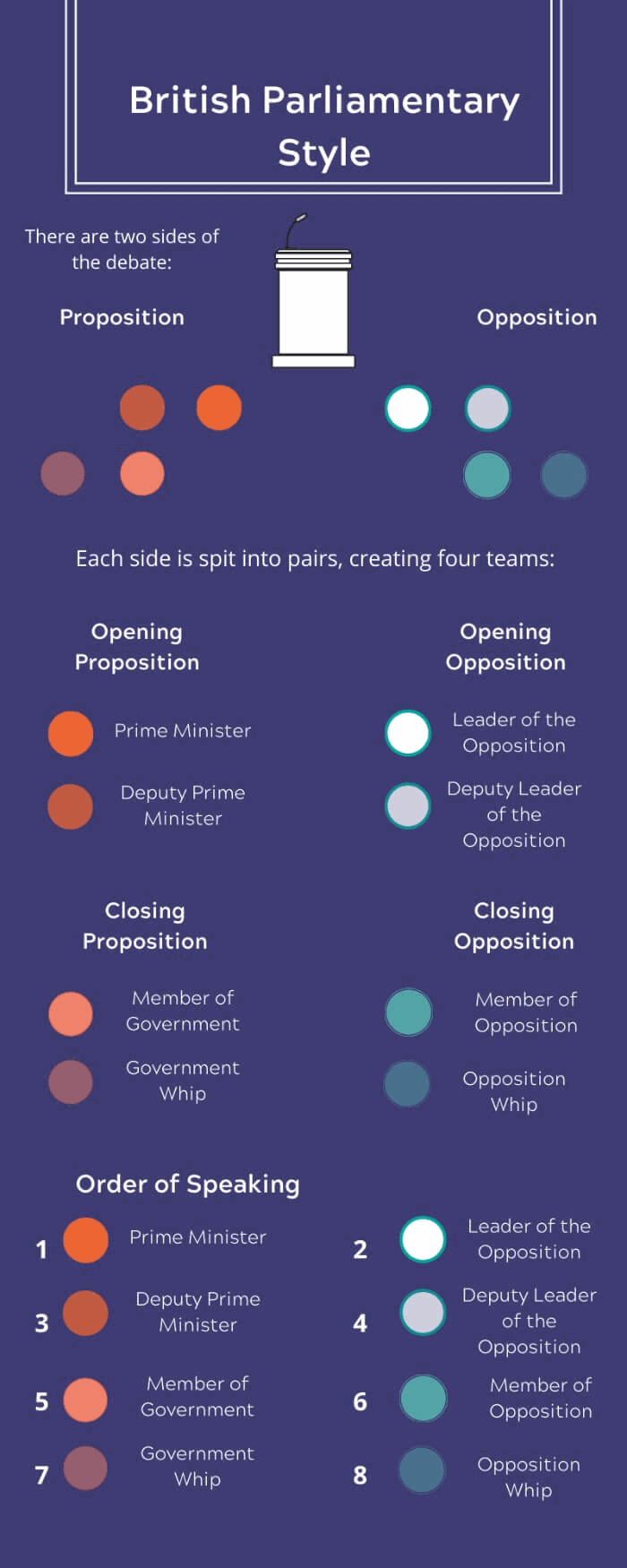
3. Public forum debate - In this style, two teams debate some 'hot' and controversial topics or current event issues. These topics are the ones you already probably have an opinion about, so this type of debate is more accessible than a policy debate.
4. Lincoln Douglas debate - This is an open, one-on-one debate style, named after a famous series of debates back in 1858 between the U.S. Senate candidates Abraham Lincoln and Stephen Douglas. In this style, debaters focus on more profound or more philosophical questions, mainly about significant issues.
5. Spontaneous argumentation - Two debaters argue on one particular topic; they need to frame their arguments in a very short time and quickly respond to their opponents' ideas without much preparation. It requires strong argumentative skills and can help boost confidence and conquer stage fright.
6. Congressional debate - This style is a simulation of the U.S. legislature, in which the debaters emulate Congress members. They debate pieces of legislation, including bills (proposed laws), resolutions (position statements). The mock Congress then vote to pass into law and continue to vote for or against the legislation.
Here we have two examples of some debates for you to better see how they happen...
1. British Parliament Debate
This is a short clip of a debate between former British prime minister Theresa May and former leader of the Labour Party, Jeremy Corbyn. The debate's dynamic atmosphere and heated arguments are typical of this kind of rowdy debate. Also, May ended her speech with such a strong statement that she even went viral!
2. The Debaters
Student debates are becoming an increasingly popular phenomenon at school; some well performed debates can even be as engaging as debates from adults. This video is one episode from an English-language Vietnamese debate show - The Debaters. These high school students debated the motion 'We applaud Greta Thunberg' in a pretty common 3-on-3 format.

A lifelong learner, a traveller and content creator eager to explore the best of both worlds: the real and virtual one full of interactive activities with AhaSlides.
Tips to Engage with Polls & Trivia
More from AhaSlides


IMAGES
VIDEO